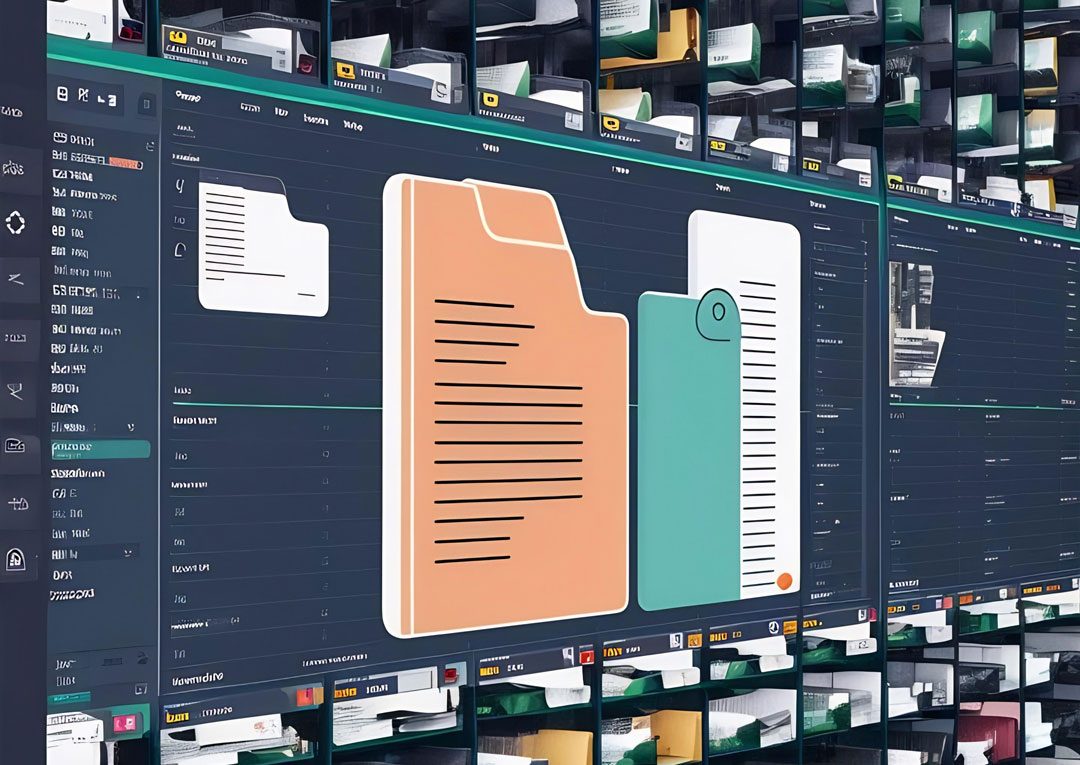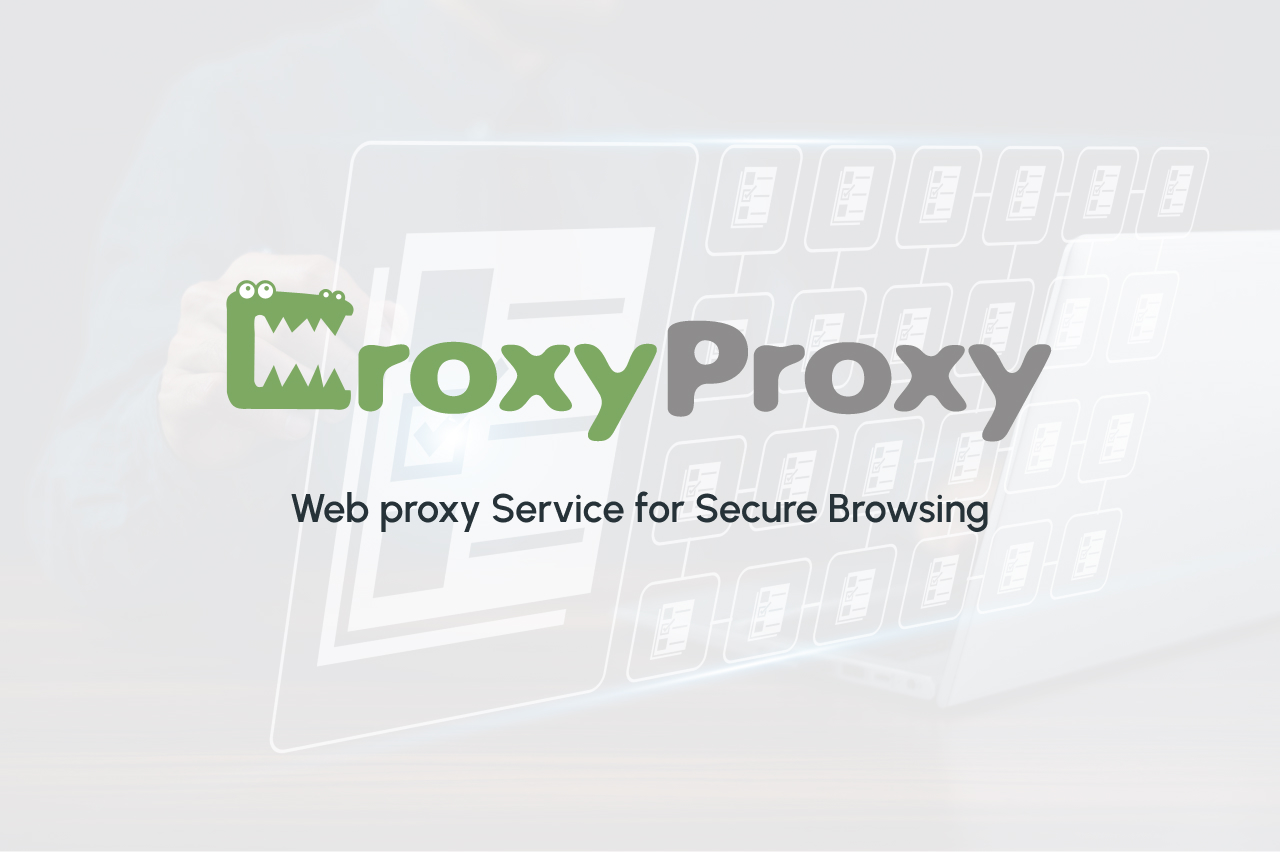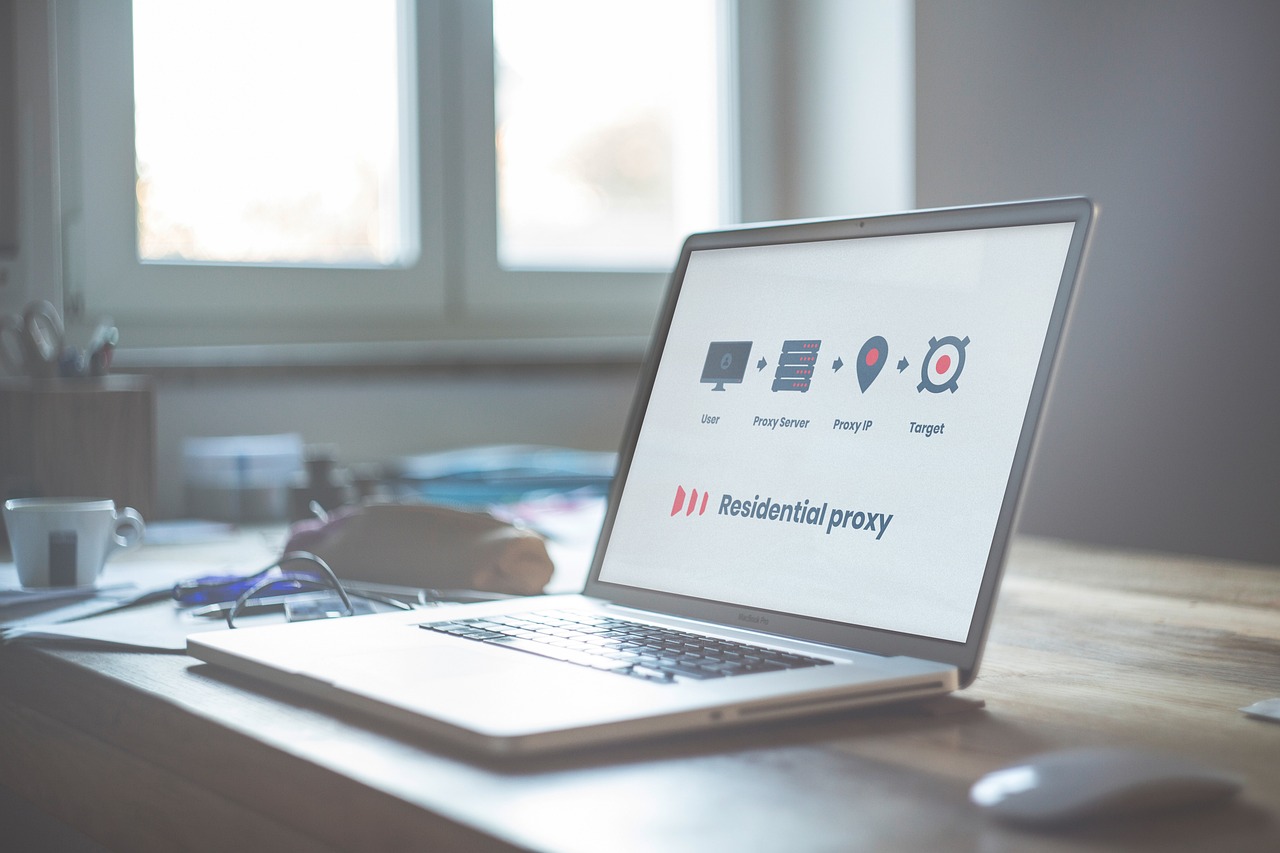Anonymous proxies help you minimize your footprints when browsing the Web by rerouting your traffic. By obscuring your actual data, such as your IP address, they make it harder for cross-site trackers to follow you around. That said, you’ll want a capable, speedy proxy with a robust privacy shield that effectively masks your identity.
In this in-depth guide, we’ll introduce you to the ten best anonymous proxies in 2024. We’ll also explain what makes a solid anonymous proxy, how to choose the best one based on your needs, which one to use for specific use cases, and more. Let’s dive right in!
Key Features of a Good Anonymous Proxy
A robust anonymous proxy should protect the security and privacy of anything you do on the Web. As such, it should enhance your privacy, help you bypass geo-blocks, prevent targeted advertising, and assist with avoiding identity theft. Let’s explain everything.
Enhancing Digital Privacy: Sending your traffic through an anonymous proxy means routing it through an intermediary that adds a privacy layer to your personal data. So, you’ll browse the Web with a higher degree of anonymity.
Bypassing Geo-Restrictions: Proxies change your IP, granting you a temporary one as long as your session is active. Since they make it look like you’re in a different region, you’ll easily bypass geo-blocks.
Preventing Targeted Advertising and Ad Frauds: Trackers rely on your IP address to follow you on the web and build a custom profile for targeted advertising. You can effectively evade such advertising by not showing or by rotating your IP address.
Preventing Identity Theft: By limiting digital tracking and having a different IP, you’ll make it harder for malicious actors to intercept your traffic. In other words, you’ll lower the risk of being a victim of identity theft.
Comparison of the Best Anonymous Proxy Providers for 2024
In this segment, we’ll review the ten best anonymous proxies based on our research and testing. We’ll first go over our anonymous proxy comparison, allowing you to skim through the most essential characteristics, and we’ll then dive into each of our recommendations.
| IP Pool | Locations | Types of Proxies | Elite Proxies | |
|---|---|---|---|---|
| Bright Data | 72M+ | 195 | Residential Datacenter ISP Mobile | Available |
| Oxylabs | 100M+ | 195 | Residential Datacenter ISP Mobile | Available |
| Nimble | N/A | 100+ | Residential | Available |
| NetNut | 85M+ | 195 | Residential Datacenter Mobile | Available |
| Smartproxy | 65M+ | 195 | Residential Datacenter Mobile | Available |
| IPRoyal | 34M+ | 195 | Residential Datacenter ISP Mobile | Available |
| SOAX | 155M+ | 195 | Residential Datacenter ISP Mobile | Available |
| Infantica | 15+ | N/A | Residential Datacenter ISP Mobile | Available |
| Oculus Proxies | 300K+ | 195 | Residential Datacenter ISP Mobile | Available |
| Private Proxy | N/A | 195 | Residential Datacenter ISP | Available |
Bright Data
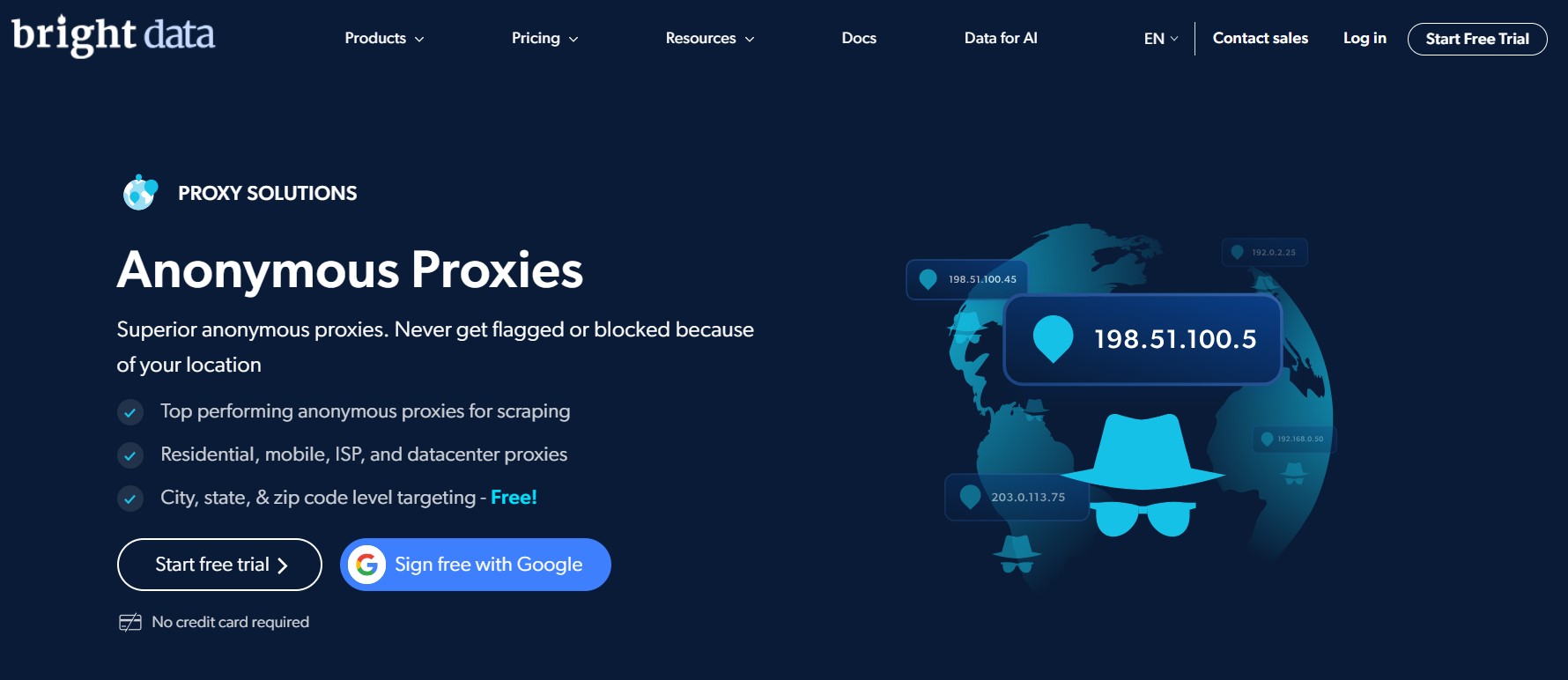 Bright Data will undoubtedly meet your needs whether you’re looking to safeguard your privacy or bypass geo-blocks. That said, you can target individual countries, regions, and cities, which works excellently for geo-blocks. You can also count on extensive documentation, a centralized dashboard, and more.
Bright Data will undoubtedly meet your needs whether you’re looking to safeguard your privacy or bypass geo-blocks. That said, you can target individual countries, regions, and cities, which works excellently for geo-blocks. You can also count on extensive documentation, a centralized dashboard, and more.
Getting started with Bright Data’s residential proxies costs $5.88/GB, while datacenter proxies cost $0.42/GB. Mobile proxies are $5.88/GB, while ISP IPs are $10.50/GB.
Oxylabs
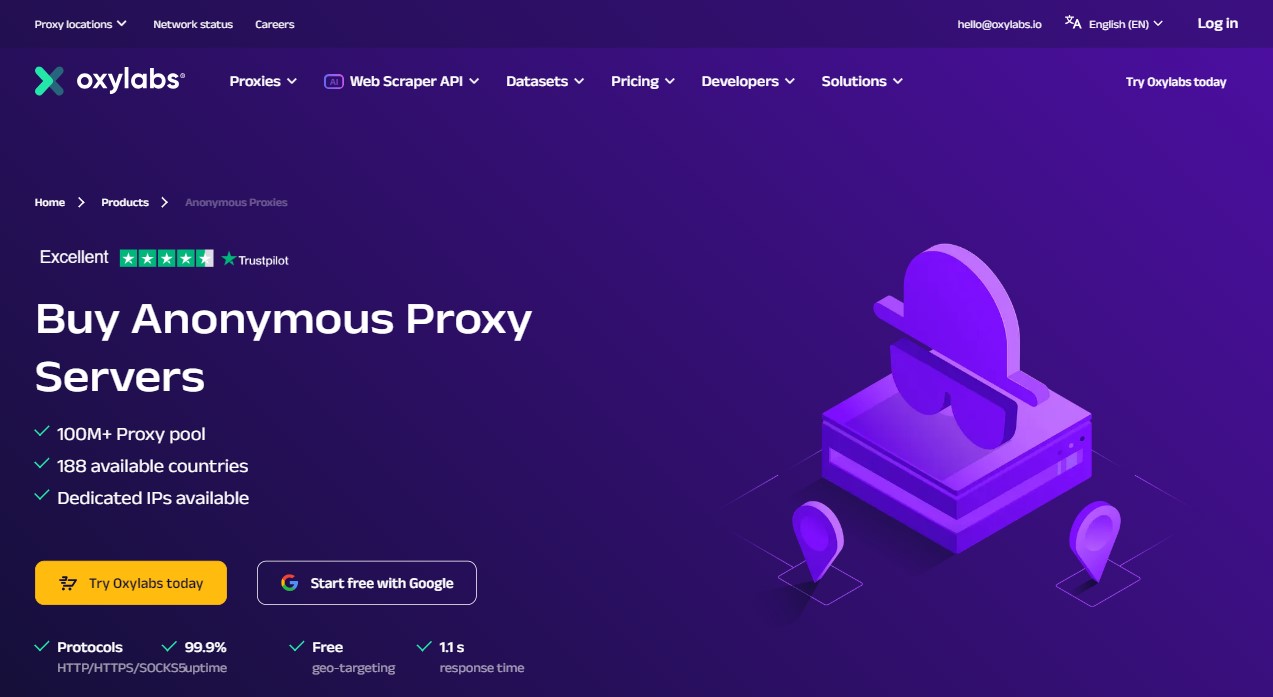 If you’re looking for an extra-wide proxy pool, know that Oxylabs comes with 100M+ IP addresses. You can count on residential, ISP, datacenter, and mobile proxies, so you’ll be covered more than well overall. All those proxies are ethically sourced, allowing you to bypass restrictions easily, avoid IP blocks and CAPTCHAs, and stay undetected.
If you’re looking for an extra-wide proxy pool, know that Oxylabs comes with 100M+ IP addresses. You can count on residential, ISP, datacenter, and mobile proxies, so you’ll be covered more than well overall. All those proxies are ethically sourced, allowing you to bypass restrictions easily, avoid IP blocks and CAPTCHAs, and stay undetected.
Thanks to their presence in 195 countries, Oxylabs’ proxy servers work great for bypassing geo-blocks. You can target specific countries, states, or cities. If you’re after the highest level of anonymity, you can also pick an elite proxy. No matter which way you choose to go, expect 24/7 support, detailed documentation, and support for any platform.
OxyLabs’ residential proxies cost $8.00/GB, while datacenter proxies are $0.65/GB. You can also choose between ISP proxies at $2.10/IP or mobile for $9.00/GB.
Nimble
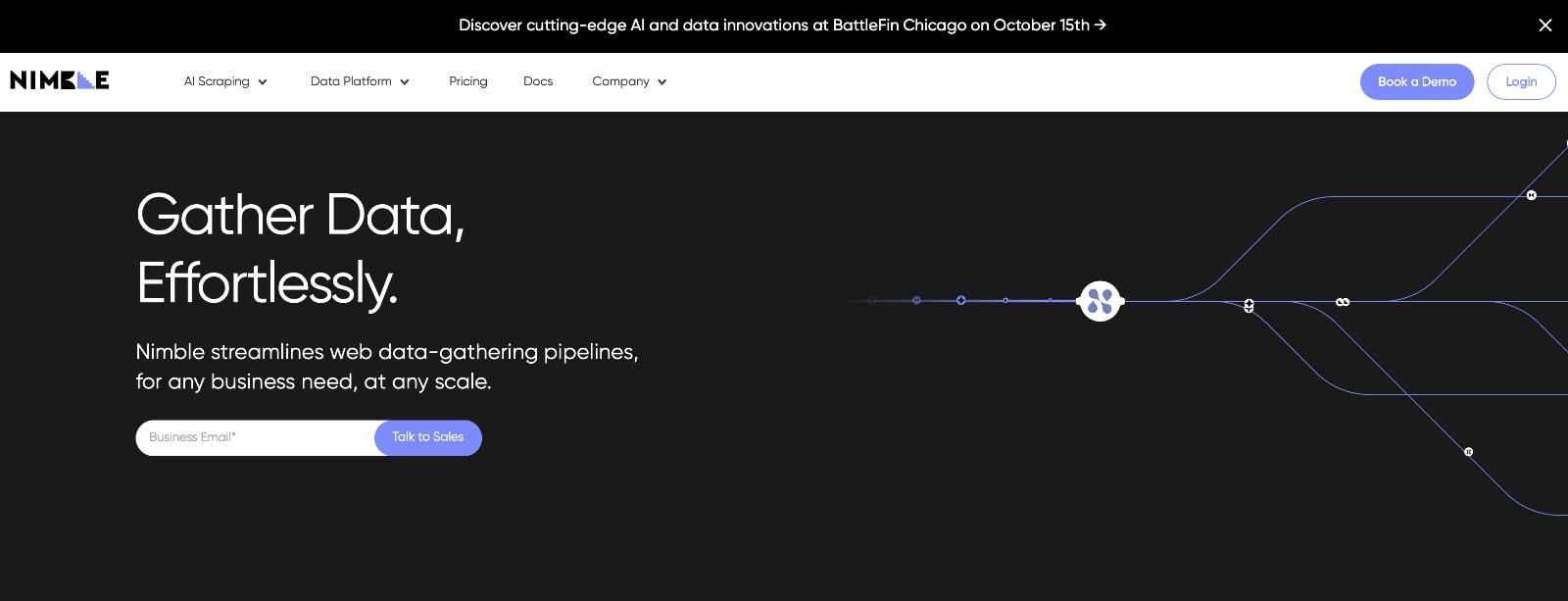 Nimble is a next-generation proxy provider that relies on artificial intelligence for scraping and reporting. It’s known for its performance, offering a 0.25s median response time, making it suitable even for more complex operations. Above all, all Nimble proxies are ethically sourced and backed by high-end cybersecurity, and they can all deliver much-needed privacy on the Web.
Nimble is a next-generation proxy provider that relies on artificial intelligence for scraping and reporting. It’s known for its performance, offering a 0.25s median response time, making it suitable even for more complex operations. Above all, all Nimble proxies are ethically sourced and backed by high-end cybersecurity, and they can all deliver much-needed privacy on the Web.
Keep in mind that Nimble’s network relies primarily on residential proxies. We don’t know the exact number of proxies, but looking at its list of covered countries, we can conclude that more than 100 locations are on offer. You can also expect high-end support and in-depth documentation explaining various setup methods and integrations.
Nimble’s residential proxies cost $8/GB, and a free trial is available. If you need more data, you can get one of its high-end plans, which range from $150 to $3,000 for enterprise customers.
NetNut
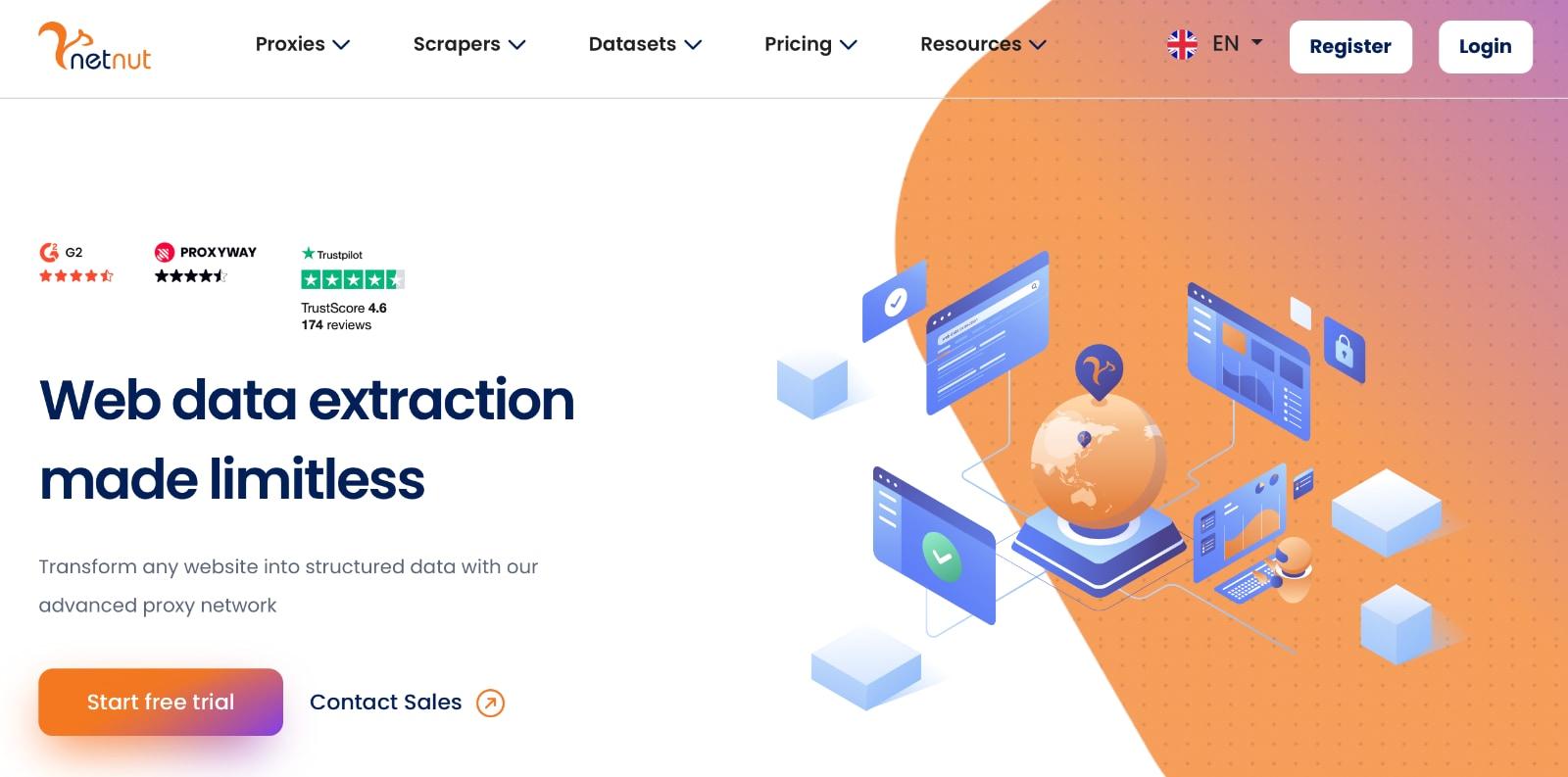 Featuring over 85M+ IP addresses, NetNut excels at geo-unblocking, performance, and it’s among the most secure anonymous proxies. You can choose from rotating or static residential proxies, datacenter and mobile proxies. Furthermore, NetNut’s network spans 195 countries and supports practically any proxy type, including HTTP, HTTPS, and SOCKS5. It also uses proprietary technology to avoid IP bans and CAPTCHAs.
Featuring over 85M+ IP addresses, NetNut excels at geo-unblocking, performance, and it’s among the most secure anonymous proxies. You can choose from rotating or static residential proxies, datacenter and mobile proxies. Furthermore, NetNut’s network spans 195 countries and supports practically any proxy type, including HTTP, HTTPS, and SOCKS5. It also uses proprietary technology to avoid IP bans and CAPTCHAs.
This proxy works without a hitch in terms of geo-unblocking. You’re allowed to target specific countries, regions, or cities. Plus, if you plan on doing intensive tasks, know that NetNut offers special ISP/P2P proxies for optimized performance. Let’s not forget to mention that 24/7 customer support and extensive technical documentation are available.
You’ll also like NetNut’s affordable pricing. Rotating residential proxies cost $5.00/GB, static ones are $7.00/GB, and datacenter proxies cost $1.00/GB. Mobile proxies are priced at $6.46/GB.
Smartproxy
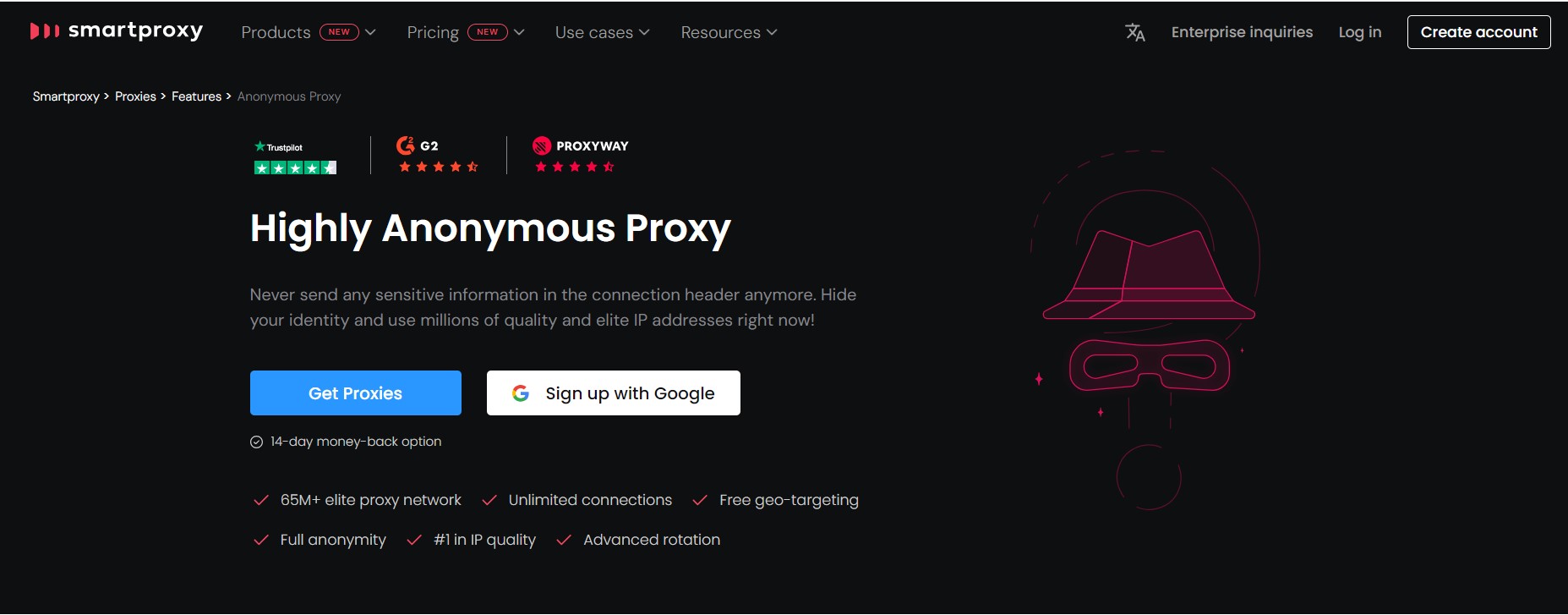 Smartproxy takes cybersecurity very seriously. All its proxies are elite, meaning they leave no trace of your original IP address. Furthermore, since packet headers will be omitted, no one will know that you use a proxy service. As expected from a high-end proxy service, you can use residential (static or rotating), mobile, and datacenter proxies across 195 countries.
Smartproxy takes cybersecurity very seriously. All its proxies are elite, meaning they leave no trace of your original IP address. Furthermore, since packet headers will be omitted, no one will know that you use a proxy service. As expected from a high-end proxy service, you can use residential (static or rotating), mobile, and datacenter proxies across 195 countries.
If you’re after fast anonymous proxies, pay attention to this provider. Smartproxy guarantees an average response time of 0.5s for residential proxies and 0.3s for datacenter ones. Geo-targeting is a breeze with this service, as it allows you to target IPs in any country or city. In case you have any questions, you can rely on its 24/7 live chat support.
Everything listed above is available at affordable prices, with residential proxies costing only $2.20/GB and mobile proxies costing $4.50/GB.
IPRoyal
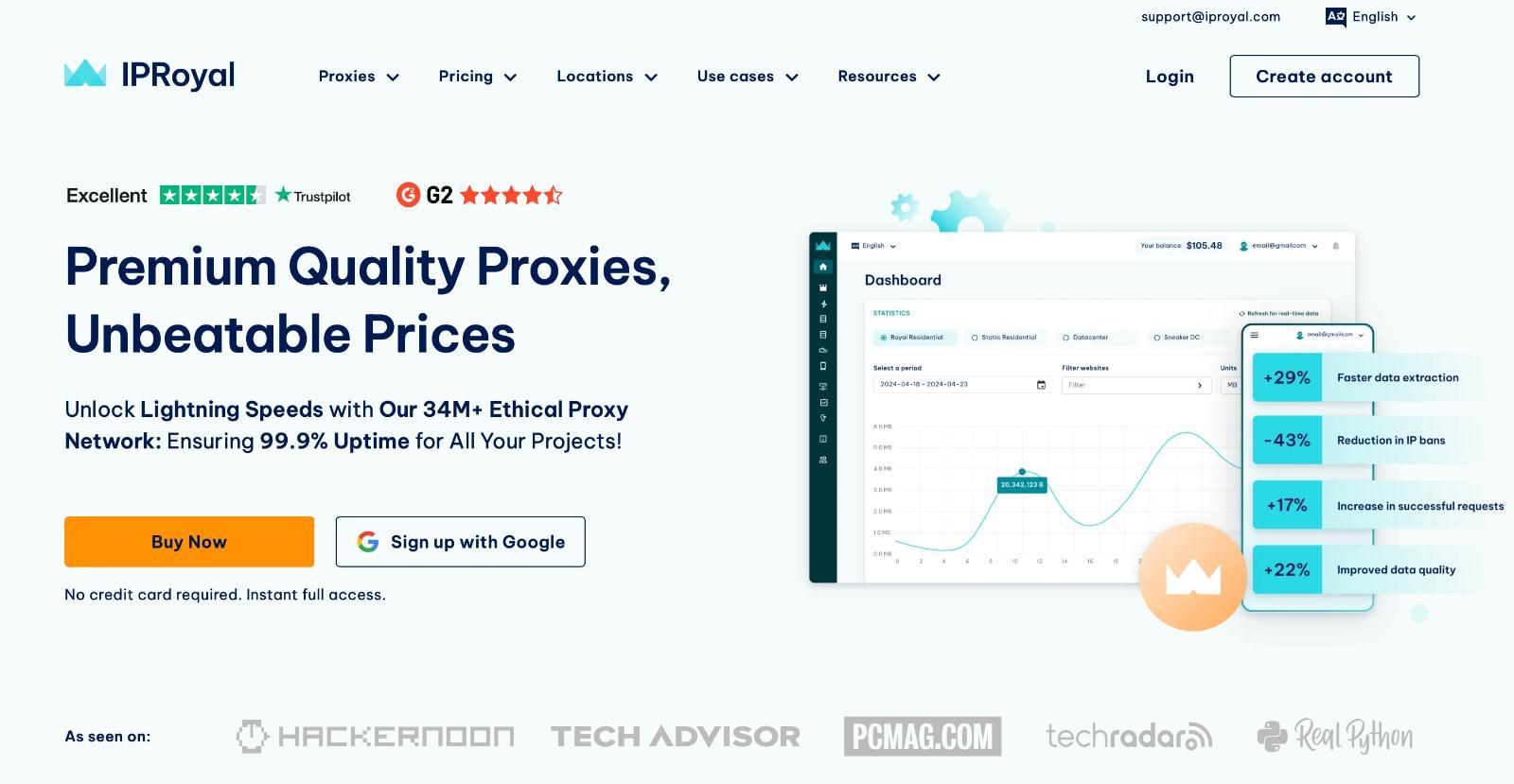 IPRoyal is a well-known brand in the world of proxy providers. It’s known for its privacy, cybersecurity measures, and 99.9% uptime. Even though it doesn’t have the largest IP pool among today’s anonymous proxies, having 34M+ IPs should meet the needs of just about any user. On top of that, it covers 195 countries. Aside from that, this provider also offers elite proxies, so you won’t leave a trace when browsing the Web.
IPRoyal is a well-known brand in the world of proxy providers. It’s known for its privacy, cybersecurity measures, and 99.9% uptime. Even though it doesn’t have the largest IP pool among today’s anonymous proxies, having 34M+ IPs should meet the needs of just about any user. On top of that, it covers 195 countries. Aside from that, this provider also offers elite proxies, so you won’t leave a trace when browsing the Web.
Regarding geo-blocks, you’ll be happy to know that IPRoyal allows you to target countries, states, and even cities. You can also decide between rotating and sticky sessions based on your end goal. IPRoyal offers unlimited concurrent connections, a 99.7% success rate, and no monthly commitment.
Getting started with IPRoyal’s residential proxies costs only $1.75/GB, while datacenter proxies are $1.39/proxy. ISP proxies cost $2.40/proxy, and mobile are $117.00/month.
SOAX
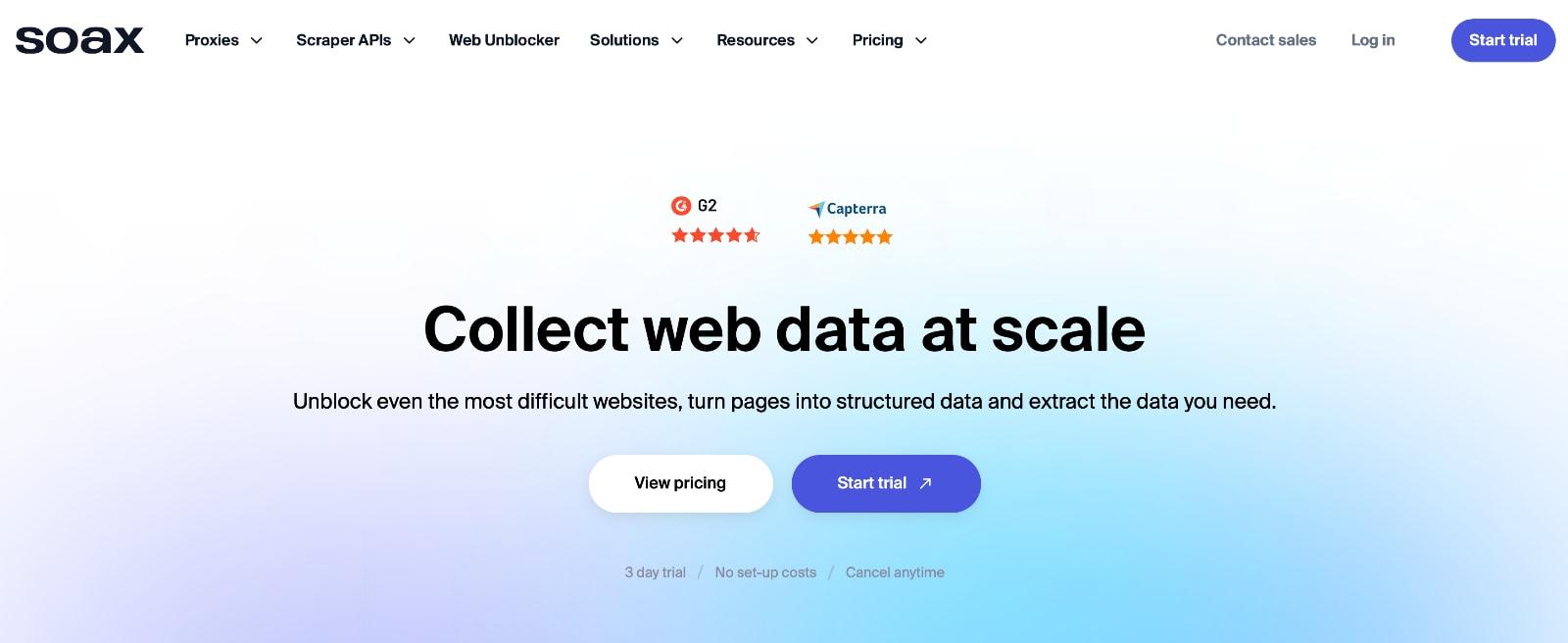 SOAX has built its name around ease of use. This high-end proxy provider offers 155M+ real IP addresses and covers 195 countries. So, in terms of finding a nearby destination server that offers ultra-fast performance, you won’t encounter a single issue. The same applies to bypass geo-restrictions, as SOAX allows you to target even individual cities. Of course, this provider is also known for its advanced cybersecurity measures.
SOAX has built its name around ease of use. This high-end proxy provider offers 155M+ real IP addresses and covers 195 countries. So, in terms of finding a nearby destination server that offers ultra-fast performance, you won’t encounter a single issue. The same applies to bypass geo-restrictions, as SOAX allows you to target even individual cities. Of course, this provider is also known for its advanced cybersecurity measures.
You’ll find plenty of features here to help anonymize your traffic. For example, this provider can automatically alter and adjust HTTP headers and use smart browser fingerprinting to prevent websites from recognizing you. Bypassing IP bans and CAPTCHAs should also be easy.
SOAX’s residential proxies cost $2.20/GB, while datacenter ones cost $0.40/GB. You can also choose from mobile ($2.20/GB) and US ISP proxies ($2.20/GB).
Infantica
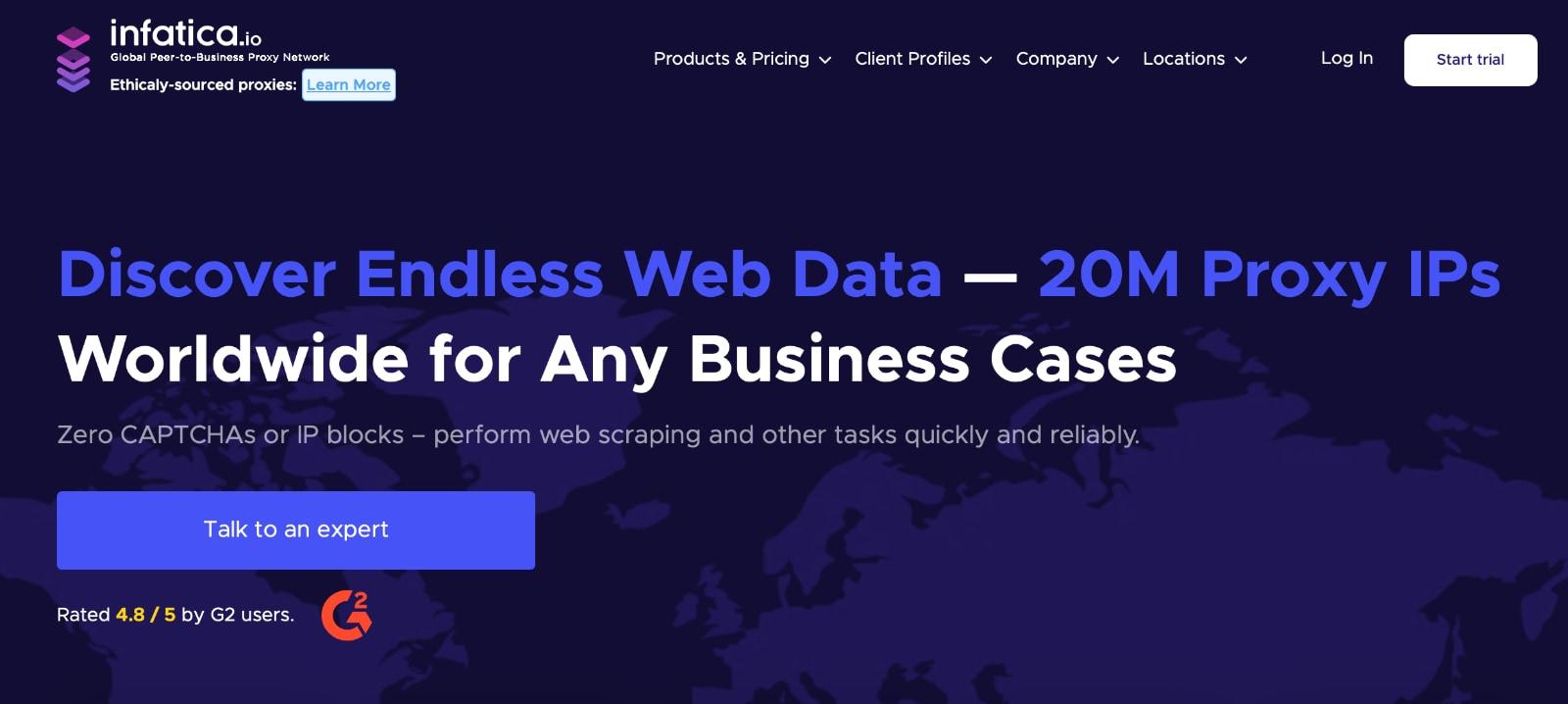 Infantica started as a residential proxy provider but now offers all major proxy types and supports HTTP(S) and SOCKS5 proxies. Regarding residential proxies, you get a pool of 15 million IPs and locations scattered across the globe. As such, this mid-level provider is among the best anonymous proxies for browsing. All those are ethically sourced IPs, so bypassing IP bans and avoiding CAPTCHA tests should not be an issue.
Infantica started as a residential proxy provider but now offers all major proxy types and supports HTTP(S) and SOCKS5 proxies. Regarding residential proxies, you get a pool of 15 million IPs and locations scattered across the globe. As such, this mid-level provider is among the best anonymous proxies for browsing. All those are ethically sourced IPs, so bypassing IP bans and avoiding CAPTCHA tests should not be an issue.
Another essential characteristic of this proxy provider is ease of use. Getting started with Infantica is easy, even if you don’t have prior experience and knowledge. You get access to a polished interface to manage, supervise, and adjust your proxy network. Aside from that, Infantica’s 24/7 customer support will always be there to answer your questions.
Infantica’s residential proxies cost $0.3/GB, ISP proxies are $5.00/proxy, and datacenter ones cost $15.00/proxy. There are also mobile proxies priced at $1.00/GB.
Oculus Proxies
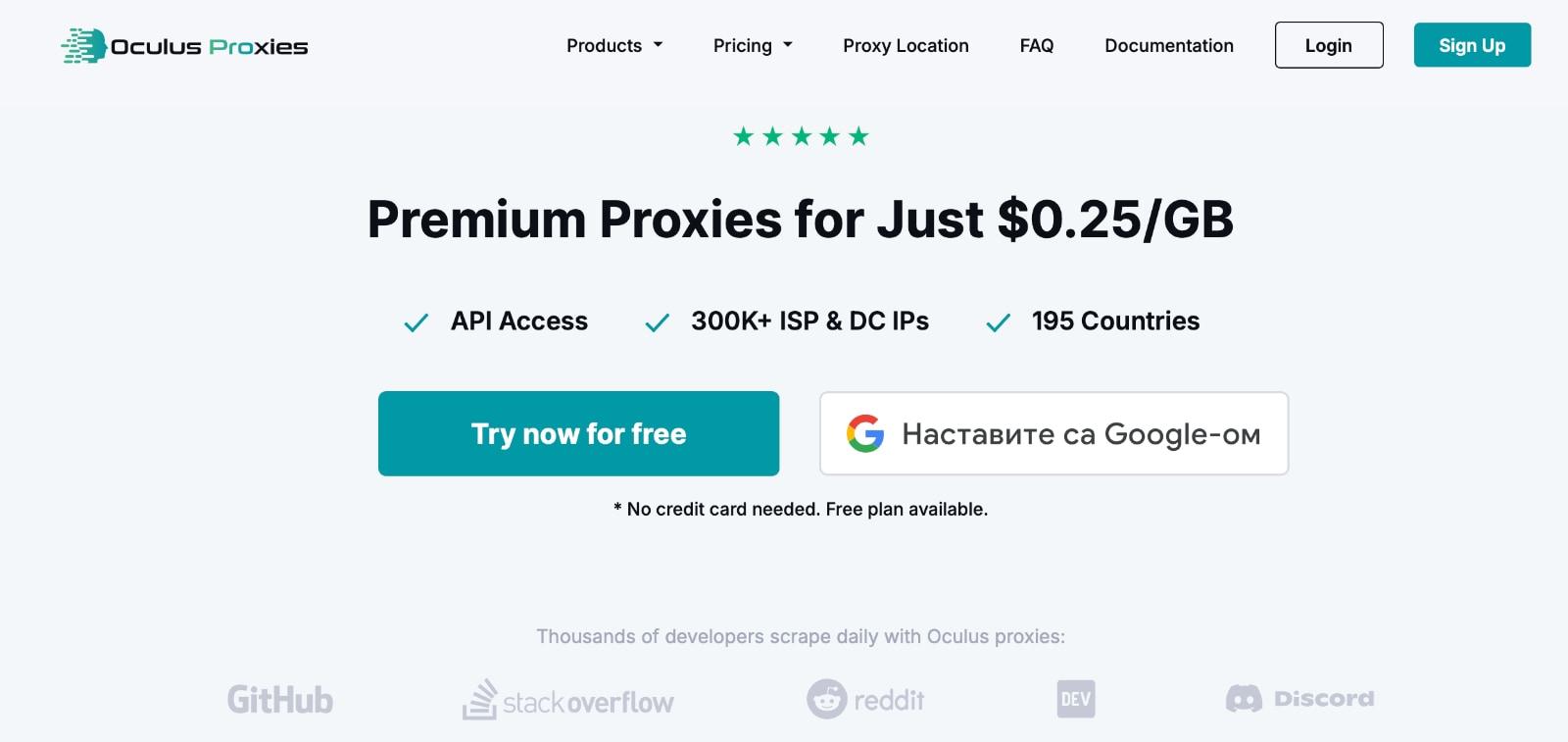 Despite having around 300K+ IP addresses, Oculus Proxies checks practically all the right boxes. It offers residential, datacenter, and ISP proxies across 195 countries. They all support protocols like HTTP, HTTPS, and SOCKS5. Plus, you get unlimited bandwidth, zero downtime, and extra-fast performance. Per this provider’s technical documentation, Oculus Proxy is powered by 100 Gbps servers, making it suitable for heavy traffic.
Despite having around 300K+ IP addresses, Oculus Proxies checks practically all the right boxes. It offers residential, datacenter, and ISP proxies across 195 countries. They all support protocols like HTTP, HTTPS, and SOCKS5. Plus, you get unlimited bandwidth, zero downtime, and extra-fast performance. Per this provider’s technical documentation, Oculus Proxy is powered by 100 Gbps servers, making it suitable for heavy traffic.
Getting started with Oculus Proxy is very simple. No KYC is needed; you only need to register an email address and pick a subscription. Then, you can use a simple dashboard to track and manage your access to proxies. This provider is more than equipped to handle cybersecurity, geo-blocks, scraping, and more.
Residental proxies start at $2.50/GB, datacenter proxies cost $0.30/GB, while ISP proxies are priced at $1.20/GB. The lowest amount of bandwidth you can buy is 10 GB.
Private Proxy
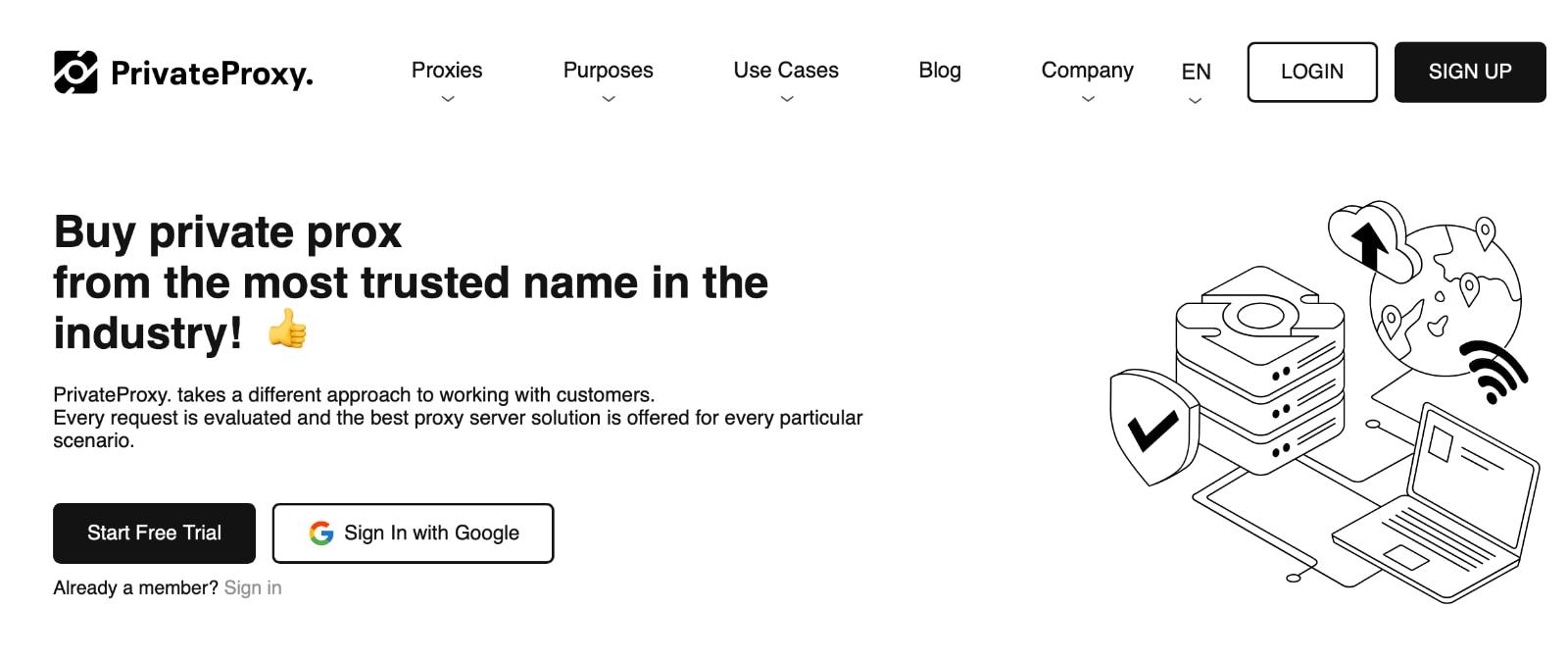 Private Proxy lets you choose from residential, datacenter, and ISP proxies. Even though this provider doesn’t reveal the size of its IP pool, it covers more than 195+ locations. Based on your needs, you can choose from SOCKS5 or SSL proxies, and you can also choose from static or rotating IP addresses. This makes Private Proxy suitable for an extensive range of possible uses.
Private Proxy lets you choose from residential, datacenter, and ISP proxies. Even though this provider doesn’t reveal the size of its IP pool, it covers more than 195+ locations. Based on your needs, you can choose from SOCKS5 or SSL proxies, and you can also choose from static or rotating IP addresses. This makes Private Proxy suitable for an extensive range of possible uses.
The only downside is that Private Proxy isn’t known for its performance. This provider should keep you covered well in terms of bypassing geo-blocks, preventing fraud, and general Web browsing. However, if you need a proxy for something more intensive, our other recommendations might serve you better.
Private Proxy’s residential proxies start at $5/month for static and $150/month for rotating IPs, while datacenter proxies cost $59/month for static and $59/month for rotating IPs.
Residential vs. Datacenter Anonymous Proxies
When choosing an anonymous proxy, you’ll most often have to pick between residential and datacenter proxies. Both of those allow you to re-route your traffic, add a layer of security to your incoming and outgoing data, as well as change your IP.
However, residential and datacenter proxies offer significant differences in terms of digital security, bypassing geo-blocks, and possible use cases. Let’s quickly compare the two through a table, and then we’ll provide additional details.
Residential Proxies: These are based on IP addresses that belong to real devices connected to the Internet. Thus, they can more easily bypass blocks like CAPTCHAs and geo-restrictions. Also, residential proxies typically offer a larger pool of IPs, featuring more variance overall and more geographic locations. However, they’re typically slower, as they’re affected by home network bandwidth.
Datacenter Proxies: Based on IP addresses belonging to data centers, this type of proxy features fast and stable overall performance. It’s good for security and privacy, but it’s less anonymous due to data center IP traceability. That said, it typically offers a more limited pool of IP addresses and doesn’t feature as many geo-locations as residential proxies.
Top Anonymous Proxies for Specific Use Cases
In this segment, we’ll go over our recommendations for the best anonymous proxies for specific use cases and priorities, such as cybersecurity, bypassing geo-blocks, performance, and scraping.
- Cybersecurity: Bright Data, Oxylabs, and Nimble offer “Elite” proxies, which means they’re among the most private anonymous proxies. They never reveal your original IP address, obscuring your physical location.
- Bypassing Geo-Restrictions: Providers such as Bright Data, Oxylabs, IPRoyal, and SOAX offer proxies across 195+ countries each. So, if your goal is to bypass geo-blocks without raising IP alarms, any of those is a fantastic pick.
- Performance: Bright Data and NetNut are generally known for their performance, as their IPs go through an in-depth screening process before being added to their networks. So, you can expect fast nearby and remote connections.
- Web Scraping: Bright Data and Oxylabs should meet your needs well if you prioritize web scraping or other demanding operations. However, check our other recommendations as well, especially smaller providers offering more specialized features for specific operations.
How to Choose the Right Anonymous Proxy Service
When browsing anonymous proxies, pay attention to each provider’s supported proxy types, device compatibility, performance, level of anonymity, number of IPs available, and its overall cost. Let’s explain everything in depth.
- Supported Proxy Types: Anonymizers rely on HTTP, HTTPS, SOCKS5, FTP, and IRC proxies to change your IP address, keep the original IP hidden, and secure your connection with a layer of encryption (in some cases). We recommend prioritizing those that support a wider variety of protocols.
- Device/Software Compatibility: Practically all proxy providers allow you to set up a connection manually on a Windows, Linux, or macOS computer. You can do the same on iOS and Android. However, some offer their own software or a browser extension that allows you to fine-tune various settings more easily.
- Speed and Performance: Each proxy provider offers different download and upload speeds. Also, remember that datacenter proxies are often faster than residential anonymous proxies. So, before you decide, see what others say about a specific provider’s performance.
- Level of Anonymity: If you need the highest level of anonymity, pick a provider that offers “Elite” proxies, as those scrub away a header that might contain information about your computer, operating system, and Web browser. However, the good news is that regular proxies are also an excellent security solution for the average home user.
- IP Pool Size: If you care about bypassing geo-blocks, having an expansive proxy network is imperative. Luckily, most of today’s proxy providers offer networks that span the entire planet. That said, inspect those networks before becoming a user to ensure you can target specific regions.
- Overall Cost: Lastly, remember that anonymous proxies’ prices can vary greatly. Some providers charge by the number of IP addresses, others allow you to buy a certain amount of bandwidth, and some offer subscription-placed plans with unlimited usage across the board.
Integrating Anonymous Proxies with Browsers and Software
There are different ways to set up a proxy, based on your goals. That said, what’s in common for all anonymous proxy providers is that you can set up individual connections manually. Here’s how that’s done across various operating systems and devices:
- Windows: Navigate to Start > Settings > Network & Internet > Proxy. Under ‘Manual Proxy Setup,’ select ‘Set Up.’ Then, you’ll need to fill out certain information your chosen proxy provider should supply.
- macOS: Go to > Apple > System Settings > Network > pick a network service you’d like to adjust > Details. Once you click ‘Proxies,’ you’ll get to add a new proxy based on the information provided by your proxy service.
- Linux: In most cases, you need to access your computer’s network management tools or configuration files. You can get precise steps by checking your Linux distribution’s documentation or contacting your proxy provider for assistance.
- iPhone/iPad: Navigate to Settings > Wi-Fi > pick the network you want to edit. Then, scroll down to ‘HTTP Proxy’ and tap ‘Configure Proxy.’ You must create a new connection based on your provider’s input.
- Android: To integrate an anonymous proxy with Android, go to Settings > Network & Internet > Internet > tap the cogwheel icon next to your network’s name. Then, consult your provider’s documentation to create a proxy connection.
We’ll also add that proxy providers typically offer extensive documentation on how to set up a proxy connection. That’s where you can learn about various ways to get started through manual configuration, using a browser proxy manager, or a dedicated desktop app.
Conclusion
A robust anonymous proxy undoubtedly has many benefits. Yes, they’re used to add a much-needed security layer to your Internet traffic. However, don’t forget about bypassing geo-blocks, preventing identity theft, and safeguarding your location’s meta-data. As you can see, it takes a lot for a proxy service to check all the right boxes.
Finally, we’ll remind you that Bright Data, OxyLabs, and Nimble are the most potent anonymous proxies right now. However, as we tried to illustrate in this article, many enticing alternatives exist, allowing you to obtain anonymous proxies, even for particular use cases, without breaking the bank.

